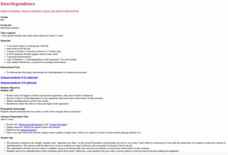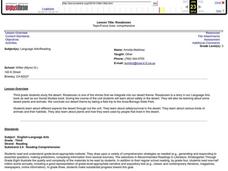Curated OER
Awesome Adaptations!
Second graders explore biology by researching animal characteristics. In this adaptation lesson, 2nd graders identify the history of several animals and research the changes that have occurred to their anatomy over thousands of years....
Virginia Department of Education
Weather Patterns and Seasonal Changes
Get your class outside to observe their surroundings with a lesson highlighting weather patterns and seasonal changes. First, learners take a weather walk to survey how the weather affects animals, people, plants, and trees during...
National Wildlife Federation
What's Your Habitat?
How are third graders like rabbits? They both live in habitats and require food, water, and shelter to survive! An educational science lesson encourages your learners to think about their own habitats and survival needs, before comparing...
Curated OER
Flutterings and Flowers
Fourth graders investigate the significance of natural resources and the habitats of butterflies. They create a list of their own favorite foods, then watch a video about habitats. Students identify things in the video that animals and...
Curated OER
Photosynthesis and Respiration
Providing an overview of photosynthesis, this presentation would be a quick and easy way to go over information learned in class. This attractive and clear presentation would be a great way to kick off an exploration of photosynthesis.
Curated OER
Exploring Ecosystems
Fourth graders create an ecosystem as a class. They have already produced smaller ones. They use a pond or something similar on school grounds to meet the needs of certain plants and animals of their ecosystem. Specifically created will...
Curated OER
School Site Ecosystem
Fourth graders are introduced to the concept of ecosystem; specifically, the interrelationships among plants and animals within an ecosystem, and their relationships to the environment in which they live and interact.
Curated OER
Food Chains Are Not A Necklace!
Second graders examine how food chains interact with different plants and animals. They practice using new vocabulary. They also discover the role of pesticides in the environment.
Curated OER
Defining Drought
Pupils examine the hydrologic impacts of drought. They look at drought from a variety of prespectives. Students first focus on the scientific definition of drought, including weather patterns, water cycles, water requirements by plants...
Curated OER
Students Solutions - Saving Our Surroundings
Students explore the environmental impact of humans on the plants and animals in their state. In this environmental impact lesson, students use digital cameras to photograph plants and animals in their state. Students investigate the...
Curated OER
Inside the Egg, Hatching Chickens
Learners conduct an egg candling activity to show the life inside a fertile egg. Students discuss the needs the egg has of the hen, as well as similarities and differences between plants and animals. Learners complete a life cycle wheel...
Curated OER
History of the Earth
Students work together in groups to research the characteristics of the Mesozoic Era. Using various sources, they must include information about climate, landforms, plants and animals found during this time period. They create a...
Curated OER
Interdependence: Discovering What Makes a Balanced Ecosystem
Students demonstrate that plants and animals are interdependent in a balanced ecosystem.
Curated OER
Investigating Local Ecosystems
Learners investigate the habitats of local plants and animals. They explore some of the ways animals depend on plants and each other. Students observe living organisms in a local ecosystem and create detailed drawings and descriptions...
Curated OER
Form and Observation
Use a familiar song and adorable baby animal pictures to teach youngsters about genetic variation. Begin by listening to "Twelve Variations on 'Ah vous dirai-je Maman,'" which you will need to find online (there are several versions...
Curated OER
Bringing the Rain to Kapiti Plain
Students identify the African Plains and the plants and animals that are found on the plain, which are of a benefit to humans. They listen to the story and actively participate in a choral reading of Bringing the Rain to Kapiti Plain.
ARKive
Temperate Rainforest in the Pacific Northwest
Explore the amazing temperate rainforest of the Pacific Northwest. Your class starts by investigating the animals and plants of the Northwest, specifically Washington, and then research an animal population common to the area. In small...
Curated OER
Summer Camp in the Classroom
Students explore wildlife plants and summer activities. For this natural science lesson, students identify plants and animals and create a scrapbook of their findings.
Curated OER
Fabulous Fossils
Seventh graders investigate how fossils are formed and discuss how scientists determine the appearance of ancient plants and animals. They make fossils of everyday objects for others to identify. They make spreadsheets to display fossil...
Curated OER
Classification 2: A Touch of Class
Students examine how many kinds of living things (e.g. plants and animals) can be sorted into groups in many ways using various features to decide which things belong to which group and that classification schemes vary with purpose.
Curated OER
Vanishing Rainforests: How can We Save Them?
Pupils focus in on the Amazon Rain forest. They research about various plants and animals that exist in our rain forests. Students develop knowledge of resources that come from our rain forests. They analyze the cause/effect of rain...
Curated OER
Roxaboxen
Third graders discuss the story "Roxaboxen." In this reading comprehension activity, 3rd graders discover new vocabulary words, discuss the story using story mapping, and take a reading test. Students investigate safety in the desert and...
Curated OER
Food Chain
Fourth graders explore the concept of food chains. In this food chain lesson, 4th graders discuss what different animals eat and how they are all connected. Students explore a garden and the environment around them to find examples of a...
Curated OER
Living in the Desert
Conduct an investigation on the plants used by the Hohokam tribe. To survive in the harsh desert environment the Hohokam used many natural resources. Learners read, research, map, and graph multiple aspects of Hohokam plant use as a...























